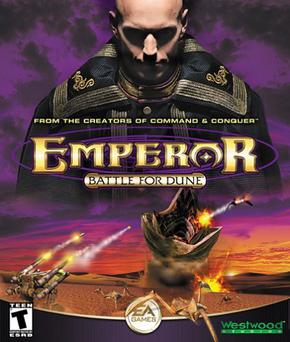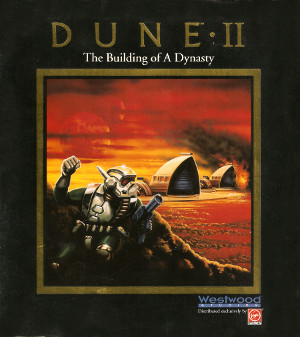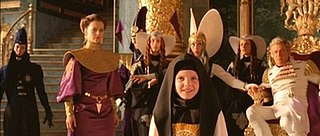
Dune is a 1965 epic science fiction novel by American author Frank Herbert, originally published as two separate serials in Analog magazine. It tied with Roger Zelazny's This Immortal for the Hugo Award for Best Novel and won the inaugural Nebula Award for Best Novel in 1966. It is the first installment of the Dune Chronicles. It is one of the world's best-selling science fiction novels.

Melange, often referred to as "the spice", is the fictional psychedelic drug central to the Dune series of science fiction novels by Frank Herbert and derivative works.

The Fremen are a group of people in the fictional Dune universe created by Frank Herbert. First appearing in the 1965 novel Dune, the Fremen inhabit the desert planet Arrakis, which is the sole known source in the universe of the all-important spice melange. Long overlooked by the rest of the Imperium and considered backward savages, in reality they are an extremely hardy people and exist in large numbers. The Fremen had come to the planet thousands of years before the events of the novel as the Zensunni Wanderers, a religious sect in retreat. As humans in extremis, over time they adapted their culture and way of life to survive and thrive in the incredibly harsh conditions of Arrakis. The Fremen are distinguished by their fierce fighting abilities and adeptness at survival in these conditions. With water being such a rare commodity on the planet, their culture revolves around its preservation and conservation. Herbert based Fremen culture, in part, on the desert-dwelling Bedouin and San People.
Arrakis —informally known as Dune and later called Rakis—is a fictional desert planet featured in the Dune series of novels by Frank Herbert. Herbert's first novel in the series, 1965's Dune, is considered one of the greatest science fiction novels of all time, and it is sometimes cited as the best-selling science fiction novel in history.

A sandworm is a fictional extraterrestrial creature that appears in the Dune novels written by Frank Herbert, first introduced in Dune (1965).

Count Hasimir Fenring is a fictional character in the Dune universe created by Frank Herbert. He is featured in the 1965 science fiction novel Dune by Frank Herbert, and is also a key character in the Prelude to Dune trilogy by Brian Herbert and Kevin J. Anderson. He later appears in the 2008 novel Paul of Dune, and the Caladan Trilogy (2020–2022).

A desert planet, also known as a dry planet, an arid planet, or a dune planet, is a type of terrestrial planet with a surface consistency similar to Earth's hot deserts. Mars is the only known example of a desert planet.

Dune is an American science fiction media franchise that originated with the 1965 novel Dune by Frank Herbert and has continued to add new publications. Dune is frequently described as the best-selling science fiction novel in history. It won the inaugural Nebula Award for Best Novel and the Hugo Award in 1966 and was later adapted into a 1984 film, a 2000 television miniseries, and a two-parter film series with the first film in 2021 and a sequel in 2024. Herbert wrote five sequels, the first two of which were concomitantly adapted as a 2003 miniseries. Dune has also inspired tabletop games and a series of video games. Since 2009, the names of planets from the Dune novels have been adopted for the real-world nomenclature of plains and other features on Saturn's moon Titan.

Dune: The Machine Crusade is a 2003 science fiction novel by Brian Herbert and Kevin J. Anderson, set in the fictional Dune universe created by Frank Herbert. It is the second book in the Legends of Dune prequel trilogy, which takes place over 10,000 years before the events of Frank Herbert's celebrated 1965 novel Dune. The series chronicles the fictional Butlerian Jihad, a crusade by the last free humans in the universe against the thinking machines, a violent and dominating force led by the sentient computer mind Omnius.

Planetary romance is a subgenre of science fiction in which the bulk of the action consists of adventures on one or more exotic alien planets, characterized by distinctive physical and cultural backgrounds. Some planetary romances take place against the background of a future culture where travel between worlds by spaceship is commonplace; others, particularly the earliest examples of the genre, do not, and invoke flying carpets, astral projection, or other methods of getting between planets. In either case, it is the planetside adventures which are the focus of the story, not the mode of travel.
A dune is a hill of sand.

Emperor: Battle for Dune is a real-time strategy video game, released by Westwood Studios in June 2001. It is based in Frank Herbert's science fiction Dune universe. It follows its predecessors, Dune II and Dune 2000. While Dune II was a distinct story to that of Dune, and Dune 2000 was a remake of Dune II, Emperor: Battle for Dune is a direct sequel to the previous games. In particular, it is a sequel to Dune 2000, carrying on from where it left off, with several of the characters and actors returning. Like Dune 2000 and many of the other Westwood games that came before it, Emperor features live action cut scenes filmed with actors.

Dune II: The Building of a Dynasty is a 1992 real-time strategy game developed by Westwood Studios and published by Virgin Games. It serves as the sequel to Dune (1992).
Worldbuilding is the process of constructing an imaginary world or setting, sometimes associated with a fictional universe. Developing the world with coherent qualities such as a history, geography, culture and ecology is a key task for many science fiction or fantasy writers. Worldbuilding often involves the creation of geography, a backstory, flora, fauna, inhabitants, technology and often if writing speculative fiction, different peoples. This may include social customs as well as invented languages for the world.
This is a list of terminology used in the fictional Dune universe created by Frank Herbert, the primary source being "Terminology of the Imperium", the glossary contained in the novel Dune (1965).
Arrakis Planitia is a planitia (plain) on Titan, the largest moon of the planet Saturn. It is located in Titan's southern hemisphere, between 74 and 80° south and 113–134° east, within the Mezzoramia region.

Multiple organizations of the Dune universe dominate the political, religious, and social arena of the setting of Frank Herbert's Dune series of science fiction novels, and derivative works. Set tens of thousands of years in the future, the saga chronicles a civilization which has banned computers but has also developed advanced technology and mental and physical abilities through physical training, eugenics and the use of the drug melange. Specialized groups of individuals have aligned themselves in organizations focusing on specific abilities, technology and goals. Herbert's concepts of human evolution and technology have been analyzed and deconstructed in at least one book, The Science of Dune (2008). His originating 1965 novel Dune is popularly considered one of the greatest science fiction novels of all time, and is frequently cited as the best-selling science fiction novel in history. Dune and its five sequels by Herbert explore the complex and multilayered interactions of politics, religion, ecology and technology, among other themes.
We've a three-point civilization: the Imperial Household balanced against the Federated Great Houses of the Landsraad, and between them, the Guild with its damnable monopoly on interstellar transport.











